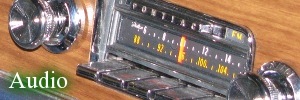















US NTSB Launches Seat Belt Campaign |
|---|
 Topics: National Transportation Safety Board
Topics: National Transportation Safety Board
|
David Clements
Washington, D.C.
June 18, 2003
 Listen to US NTSB Launches Seat Belt Campaign - RealPlayer - 458KB - 3:43
Listen to US NTSB Launches Seat Belt Campaign - RealPlayer - 458KB - 3:43
Seat belts have been standard equipment on U.S. cars for more than 30 years now. According to the National Traffic Safety Bureau or NTSB, 75 percent of drivers actually use them. But the NTSB wants even more Americans to buckle up. It is taking a campaign on the road, and on the air.
Seat belts save lives. Study after study by the National Traffic Safety Bureau has shown that seat belts make car crashes more survivable and reduce injuries. That's convinced state legislatures across the country to pass laws requiring seat belt use. But buckling up has become second nature to most Americans.
DRIVER 1: I don't get in the car without putting it on.
DRIVER 2: I work in an aviation agency, so I learned the value of seat belts from my profession, and I wear it all the time, so does my wife.
CLEMENTS: What do you say to people who are in the car with you and don't want to buckle up?
DRIVER 2: I suggest they buckle up.
CLEMENTS: How do you feel when you aren't wearing your seatbelt?
DRIVER 3: Not very safe sometimes! I feel like I don't have my clothes on. I kinda feel, I feel lost, like something's not right when I forget to put it on.
CLEMENTS: What do you say to people who are in the car with you and don't buckle up?
DRIVER 3: You don't buckle up, we don't move.
DRIVER 4: I wear my seatbelt everyday. I wear it to protect myself. I make sure every passenger in my car is wearing one. It's just for my security and theirs, because you know when everybody is in my car they're under my supervision.
However, for some people, NTSB statistics and the threat of a traffic ticket just aren't enough to make them fasten their safety belts.
DRIVER 5: I don't like wearing it. I feel all restrained in.
CLEMENTS: Have you ever been pulled over for not wearing your seatbelt?
DRIVER 5: Yeah, A couple times.
CLEMENTS: Getting a ticket wasn't enough?
DRIVER 5: No, it's uncomfortable. I think it should be your choice. If you want to be safe, you be safe. If you don't, you don't.
CLEMENTS: Have you ever gotten tickets for not wearing your seatbelt?
DRIVER 6: Yeah. I have. When I got a ticket last time, I started doing it for a while but then after I while, I was just like, oh well, until I got the next ticket and I did it again.
From this unscientific survey, the younger drivers seem far less willing to buckle up and NTSB spokeswoman Elly Martin says that's in line with the agency's findings.
"Our latest and largest campaign in the United States has been targeted at high risk groups which are principally teenagers, young people and disproportionally males," Ms. Martin said. "We know they are at greater risk, 16 to 19 year olds, than any other group of being fatally injured in a car crash."
In an effort to reach more adolescents, the NTSB is targeting younger drivers with a lot more marketing money this year than in the past.
"This is the first time we've used extensive paid advertising paid for by Congress," said Ms. Martin. "Congress has recognized that it takes more than simply public service announcements aired infrequently. The combination of these kinds of television commercials, high impact television commercials, with high impact inforcement campaigns have been found to be extermely effective in encouraging the use of seat belts."
The NTSB has already spent $25 million on its media campaign and it will be some time before its impact can be measured. Ms. Martin says getting this message out now is critical, because used Sport Utility Vehicles are now becoming more and more affordable for teenagers. Since most SUVs have a higher center of gravity than a normal automobile, the risk of a rollover is typically greater. According to the NTSB, unbelted occupants in a vehicle that rolls over are even less likely to survive.
Certain states have been more effective at getting the message out about safety belt usage than others. California has 91 percent of its residents buckling up while Massachusetts sits near the bottom of the country at only 51 percent.
